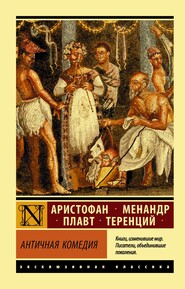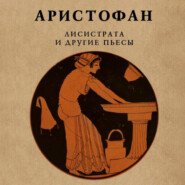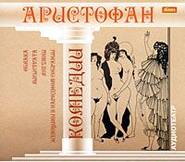По всем вопросам обращайтесь на: info@litportal.ru
(©) 2003-2025.
✖
Peace
Автор
Год написания книги
2018
Настройки чтения
Размер шрифта
Высота строк
Поля
TRYGAEUS Gently, gently, go easy, beetle; don't start off so proudly, or trust at first too greatly to your powers; wait till you have sweated, till the beating of your wings shall make your limb joints supple. Above all things, don't let off some foul smell, I adjure you; else I would rather have you stop in the stable altogether.
SECOND SERVANT Poor master! Is he crazy?
TRYGAEUS Silence! silence!
SECOND SERVANT (TO TRYGAEUS) But why start up into the air on chance?
TRYGAEUS 'Tis for the weal of all the Greeks; I am attempting a daring and novel feat.
SECOND SERVANT But what is your purpose? What useless folly!
TRYGAEUS No words of ill omen! Give vent to joy and command all men to keep silence, to close down their drains and privies with new tiles and to stop up their own vent-holes[3 - Fearing that if it caught a whiff from earth to its liking, the beetle might descend from the highest heaven to satisfy itself.].
FIRST SERVANT No, I shall not be silent, unless you tell me where you are going.
TRYGAEUS Why, where am I likely to be going across the sky, if it be not to visit Zeus?
FIRST SERVANT For what purpose?
TRYGAEUS I want to ask him what he reckons to do for all the Greeks.
SECOND SERVANT And if he doesn't tell you?
TRYGAEUS I shall pursue him at law as a traitor who sells Greece to the Medes.[4 - The Persians and the Spartans were not then allied as the scholiast states, since a treaty between them was only concluded in 412 B.C., i.e. eight years after the production of 'Peace'; the great king, however, was trying to derive advantages out of the dissensions in Greece.]
SECOND SERVANT Death seize me, if I let you go.
TRYGAEUS It is absolutely necessary.
SECOND SERVANT Alas! alas! dear little girls, your father is deserting you secretly to go to heaven. Ah! poor orphans, entreat him, beseech him.
LITTLE DAUGHTER Father! father! what is this I hear? Is it true? What! you would leave me, you would vanish into the sky, you would go to the crows?[5 - "Go to the crows," a proverbial expression equivalent to our "Go to the devil."] 'Tis impossible! Answer, father, an you love me.
TRYGAEUS Yes, I am going. You hurt me too sorely, my daughters, when you ask me for bread, calling me your daddy, and there is not the ghost of an obolus in the house; if I succeed and come back, you will have a barley loaf every morning—and a punch in the eye for sauce!
LITTLE DAUGHTER But how will you make the journey? 'Tis not a ship that will carry you thither.
TRYGAEUS No, but this winged steed will.
LITTLE DAUGHTER But what an idea, daddy, to harness a beetle, on which to fly to the gods.
TRYGAEUS We see from Aesop's fables that they alone can fly to the abode of the Immortals.[6 - Aesop tells us that the eagle and the beetle were at war; the eagle devoured the beetle's young and the latter got into its nest and tumbled out its eggs. On this the eagle complained to Zeus, who advised it to lay its eggs in his bosom; but the beetle flew up to the abode of Zeus, who, forgetful of the eagle's eggs, at once rose to chase off the objectionable insect. The eggs fell to earth and were smashed to bits.]
LITTLE DAUGHTER Father, father, 'tis a tale nobody can believe! that such a stinking creature can have gone to the gods.
TRYGAEUS It went to have vengeance on the eagle and break its eggs.
LITTLE DAUGHTER Why not saddle Pegasus? you would have a more TRAGIC[7 - Pegasus is introduced by Euripides both in his 'Andromeda' and his 'Bellerophon.'] appearance in the eyes of the gods.
TRYGAEUS Eh! don't you see, little fool, that then twice the food would be wanted? Whereas my beetle devours again as filth what I have eaten myself.
LITTLE DAUGHTER And if it fell into the watery depths of the sea, could it escape with its wings?
TRYGAEUS (EXPOSING HIMSELF) I am fitted with a rudder in case of need, and my Naxos beetle will serve me as a boat.[8 - Boats, called 'beetles,' doubtless because in form they resembled these insects, were built at Naxos.]
LITTLE DAUGHTER And what harbour will you put in at?
TRYGAEUS Why is there not the harbour of Cantharos at the Piraeus?[9 - Nature had divided the Piraeus into three basins— Cantharos, Aphrodisium and Zea. (Cantharos) is Greek for dung-beetle.]
LITTLE DAUGHTER Take care not to knock against anything and so fall off into space; once a cripple, you would be a fit subject for Euripides, who would put you into a tragedy[10 - In allusion to Euripides' fondness for introducing lame heroes in his plays.].
TRYGAEUS I'll see to it. Good-bye! (TO THE ATHENIANS.) You, for love of whom I brave these dangers, do ye neither let wind nor go to stool for the space of three days, for, if, while cleaving the air, my steed should scent anything, he would fling me head foremost from the summit of my hopes. Now come, my Pegasus, get a-going with up-pricked ears and make your golden bridle resound gaily. Eh! what are you doing? What are you up to? Do you turn your nose towards the cesspools? Come, pluck up a spirit; rush upwards from the earth, stretch out your speedy wings and make straight for the palace of Zeus; for once give up foraging in your daily food.—Hi! you down there, what are you after now? Oh! my god! 'tis a man emptying his belly in the Piraeus, close to the house where the bad girls are. But is it my death you seek then, my death? Will you not bury that right away and pile a great heap of earth upon it and plant wild thyme therein and pour perfumes on it? If I were to fall from up here and misfortune happened to me, the town of Chios[11 - An allusion to the proverbial nickname applied to the Chians (in Greek)—'crapping Chian.' There is a further joke, of course, in connection with the hundred and one frivolous pretexts which the Athenians invented for exacting contributions from the maritime allies.] would owe a fine of five talents for my death, all along of your cursed rump. Alas! how frightened I am! oh! I have no heart for jests. Ah! machinist, take great care of me. There is already a wind whirling round my navel; take great care or, from sheer fright, I shall form food for my beetle.... But I think I am no longer far from the gods; aye, that is the dwelling of Zeus, I perceive. Hullo! Hi! where is the doorkeeper? Will no one open?
(THE SCENE CHANGES AND HEAVEN IS PRESENTED.)
HERMES Meseems I can sniff a man. (HE PERCEIVES TRYGAEUS ASTRIDE HIS BEETLE.) Why, what plague is this?
TRYGAEUS A horse-beetle.
HERMES Oh! impudent, shameless rascal! oh! scoundrel! triple scoundrel! the greatest scoundrel in the world! how did you come here? Oh! scoundrel of all scoundrels! your name? Reply.
TRYGAEUS Triple scoundrel.
HERMES Your country?
TRYGAEUS Triple scoundrel.
HERMES Your father?
TRYGAEUS My father? Triple scoundrel.
HERMES By the Earth, you shall die, unless you tell me your name.
TRYGAEUS I am Trygaeus of the Athmonian deme, a good vine-dresser, little addicted to quibbling and not at all an informer.
HERMES Why do you come?
TRYGAEUS I come to bring you this meat.
HERMES Ah! my good friend, did you have a good journey?
TRYGAEUS Glutton, be off! I no longer seem a triple scoundrel to you. Come, call Zeus.
HERMES Ah! ah! you are a long way yet from reaching the gods, for they moved yesterday.
TRYGAEUS To what part of the earth?
HERMES Eh! of the earth, did you say?











